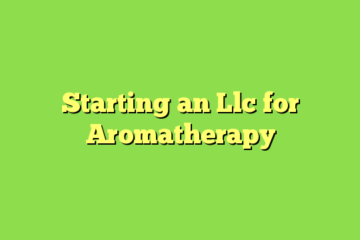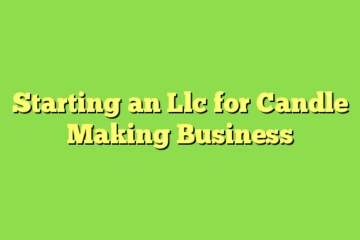Are you passionate about ballroom dance and want to turn your passion into a profitable business? Starting an LLC for ballroom dance lessons is a practical and rewarding endeavor.
In this article, we will guide you through the essential steps to get your LLC up and running. From choosing a business name to understanding tax obligations, we will provide you with the necessary information to navigate the process smoothly.
Get ready to make your dream of teaching ballroom dance a reality!
Choose a name that reflects your brand and resonates with your target audience. Obtain appropriate insurance coverage and require clients to sign waiver forms to protect against accidents or injuries. Gather necessary legal documents and register the LLC to enjoy legal protection and separate personal assets from business liabilities. Contact local government offices to obtain permits and licenses and ensure compliance with local regulations.
Choosing a Business Name
When choosing your business name for your LLC for ballroom dance lessons, it’s important to consider a name that reflects your brand and resonates with your target audience. Coming up with a unique business name is crucial to stand out in the competitive market. Your business name should capture the essence of what you offer and create a memorable impression on potential customers.
To begin, brainstorm ideas that relate to ballroom dance and your teaching style. Think about words that evoke elegance, grace, and passion. Consider incorporating your own name or a clever play on words. Conduct a thorough search to ensure that the name you choose isn’t already trademarked by another business. Avoiding trademark conflicts is essential to avoid legal issues in the future.
Once you have a list of potential names, test them out by asking for feedback from friends, family, and potential customers. Consider their opinions and make adjustments if necessary. It’s also a good idea to check if the domain name for your chosen business name is available, as having a consistent online presence is important for marketing your business.
Determining the LLC Structure
Now that you have chosen a business name, it’s time to determine the LLC structure for your ballroom dance lessons.
This involves considering member ownership options, tax implications and benefits, as well as liability protection considerations.
Member Ownership Options
To determine the LLC structure for your ballroom dance lessons business, consider the various member ownership options available.
Member voting is an important aspect of LLC ownership. It allows members to have a say in the decision-making process of the business. Depending on the structure you choose, each member may have an equal vote, or voting power may be allocated based on the percentage of ownership. Consider how you want decisions to be made within your LLC and choose a structure that aligns with your goals and values.
Profit sharing is another crucial factor to consider. LLCs offer flexibility when it comes to distributing profits among members. You can choose to distribute profits equally among all members, or you can allocate profits based on the percentage of ownership. Take into account the financial goals and expectations of your members when deciding on a profit sharing structure.
Tax Implications and Benefits
As you continue to consider the LLC structure for your ballroom dance lessons business, it’s important to understand the tax implications and benefits that come with each option.
One of the advantages of forming an LLC is the ability to take advantage of tax deductions. As an LLC owner, you may be eligible to deduct business expenses such as studio rental fees, costumes, music licensing fees, and marketing expenses. These deductions can help reduce your taxable income and potentially lower your overall tax liability.
Additionally, by operating as an LLC, you can also benefit from the flexibility of the self-employment tax. Unlike traditional corporations, LLCs aren’t subject to double taxation. Instead, LLC owners are only required to pay self-employment tax on their share of the business profits. This can result in significant tax savings compared to other business structures.
To maximize your tax benefits, it’s recommended to consult with a tax professional who can provide guidance tailored to your specific situation. They can help ensure you take advantage of all available deductions and navigate the complexities of self-employment tax.
Liability Protection Considerations
To determine the LLC structure that provides liability protection for your ballroom dance lessons business, you should consider various factors.
One crucial aspect to consider is insurance coverage. As a dance instructor, accidents or injuries may occur during your lessons, and having the appropriate insurance coverage can help protect you from potential lawsuits and financial losses. General liability insurance can cover bodily injury, property damage, and personal injury claims.
Additionally, you may want to require your clients to sign waiver forms before participating in your dance lessons. These forms can help protect your business by clearly outlining the risks involved and releasing you from liability in case of any accidents or injuries.
Registering Your LLC
Now that you have determined the structure for your LLC, it’s important to understand the legal requirements for registering your business.
Registering your LLC will provide you with the legal protection and benefits that come with being a registered entity.
Legal Requirements for LLC Registration
Before you begin registering your LLC for ballroom dance lessons, it’s important to understand the legal requirements involved.
To successfully register your LLC, you’ll need to gather the necessary legal documents and be prepared to pay the required filing fees.
These legal documents typically include the Articles of Organization, which outline the basic details of your LLC, such as its name, address, and purpose.
Additionally, you may need to provide an operating agreement, which establishes the ownership and management structure of your LLC.
When it comes to filing fees, the cost can vary depending on the state in which you’re registering your LLC.
It’s crucial to research and understand the specific filing fees required by your state to ensure compliance with the legal requirements.
Benefits of Registering LLC
One benefit of registering your LLC for ballroom dance lessons is that it provides you with legal protection and separates your personal assets from your business liabilities. By forming an LLC, you create a separate legal entity that shields your personal finances from any debts or legal claims your business may incur. This means that if your business faces a lawsuit or bankruptcy, your personal assets, such as your home or car, are protected.
Another advantage of registering your LLC is the potential tax benefits. LLCs have the flexibility to choose how they’re taxed, allowing you to take advantage of deductions and credits that can lower your overall tax liability.
However, it’s important to note that there are also some disadvantages to consider, such as additional paperwork and fees associated with forming and maintaining an LLC.
Obtaining the Necessary Permits and Licenses
To operate your ballroom dance lessons LLC, you’ll need to obtain the necessary permits and licenses.
First and foremost, you should focus on obtaining the necessary certifications. This includes certifications for yourself as a ballroom dance instructor, as well as any certifications required by your local government or dance-related organizations. These certifications won’t only enhance your credibility but also ensure that you have the necessary skills and knowledge to provide high-quality dance lessons.
Additionally, finding suitable dance studio space is crucial for your LLC. Look for a location that’s easily accessible to your target audience and has the necessary facilities, such as dance floors and mirrors. Consider factors such as parking availability and nearby amenities for the convenience of your clients. It’s also important to ensure that the space meets all safety and zoning requirements.
Once you have identified the ideal studio space, you must obtain the necessary permits and licenses. Contact your local government offices to inquire about the specific permits and licenses required for operating a dance studio. This may include business licenses, permits for occupying commercial space, and health and safety inspections. It’s essential to complete all the necessary paperwork and pay any associated fees to ensure that your business is operating legally and in compliance with local regulations.
Setting Up Business Bank Accounts and Bookkeeping
Now that you have obtained the necessary permits and licenses for your ballroom dance lessons LLC, it’s important to regularly set up business bank accounts and maintain accurate bookkeeping to effectively manage your finances.
Setting up business bank accounts is crucial for separating your personal and business finances. It allows you to track income and expenses specific to your ballroom dance lessons, making it easier to manage your cash flow and monitor the financial health of your business.
When setting up your business bank accounts, consider choosing a bank that offers features tailored to small businesses. Look for accounts with low fees, convenient online banking platforms, and perks such as overdraft protection. It’s also a good idea to open separate accounts for your operating expenses, tax payments, and payroll.
Speaking of payroll, setting up a system for managing employee compensation is another crucial aspect of running a successful ballroom dance lessons LLC. Whether you have instructors or administrative staff, it’s important to ensure that they’re paid accurately and on time. Consider using payroll software or outsourcing this task to a professional payroll service to simplify the process and avoid any potential errors or compliance issues.
Accurate bookkeeping is essential for maintaining financial transparency and making informed business decisions. Use accounting software or hire a professional bookkeeper to record all income and expenses, reconcile bank statements, and generate financial reports. Regularly review your financial statements to monitor your cash flow, identify areas for improvement, and make informed decisions about your business’s future.
Understanding Tax Obligations and Benefits
To properly manage your ballroom dance lessons LLC, it’s essential to understand your tax obligations and benefits. As a business owner, you must be aware of the tax deductions available to you and the tax filing requirements you need to meet. By taking advantage of these deductions, you can reduce your taxable income and potentially save money.
One of the key benefits of starting an LLC is the ability to deduct certain business expenses. This includes expenses related to your ballroom dance lessons, such as studio rental fees, music and equipment purchases, and marketing costs. Keeping detailed records of these expenses is crucial for accurate tax filing and maximizing your deductions.
In terms of tax filing requirements, LLCs have flexibility in how they’re taxed. By default, a single-member LLC is considered a ‘disregarded entity’ for tax purposes, meaning that you’ll report your business income and expenses on your personal tax return. However, if you have multiple members in your LLC, you can choose to be taxed as a partnership or even elect to be taxed as a corporation.
It is important to consult with a tax professional or accountant to ensure that you’re meeting all your tax obligations and taking advantage of any available benefits. They can guide you through the process and help you navigate the complex world of tax deductions and filing requirements.
Conclusion
In conclusion, starting an LLC for ballroom dance lessons requires careful consideration of various factors:
- Choosing a business name
- Determining the LLC structure
- Registering the LLC
- Obtaining necessary permits and licenses
- Setting up business bank accounts and bookkeeping
- Understanding tax obligations and benefits
By following these steps, you can establish a professional and legally compliant dance instruction business that can thrive in the competitive market.
Good luck on your entrepreneurial journey!
Frequently Asked Questions
How Can I Find a Suitable Location for My Ballroom Dance Lessons?
To find a suitable location for your ballroom dance lessons, consider budget considerations. Look for spaces that can accommodate your needs, such as dance studios or community centers, and negotiate rental terms that fit your budget.
What Are Some Effective Marketing Strategies for Promoting My Llc?
To effectively promote your LLC, consider online advertising and social media marketing. These strategies can help you reach a wider audience and showcase the benefits of your ballroom dance lessons.
Is It Necessary to Have Liability Insurance for My Ballroom Dance Llc?
Yes, it is necessary to have liability insurance for your ballroom dance LLC. It is a legal requirement and helps protect you from potential financial losses if someone is injured during your lessons.
How Can I Attract and Retain Qualified Dance Instructors for My Business?
To attract and retain qualified dance instructors for your business, offer competitive compensation, provide opportunities for professional development, create a positive and supportive work environment, and promote the reputation and success of your LLC.
What Are Some Common Challenges Faced by LLC Owners in the Ballroom Dance Industry, and How Can I Overcome Them?
To overcome challenges faced by LLC owners in the ballroom dance industry, focus on finding funding by exploring grants and loans. Build a strong customer base through targeted marketing and offering high-quality dance lessons that cater to different skill levels and interests.
This article is created with the aid of automated technology and then carefully reviewed and verified for accuracy by our professional editors.








